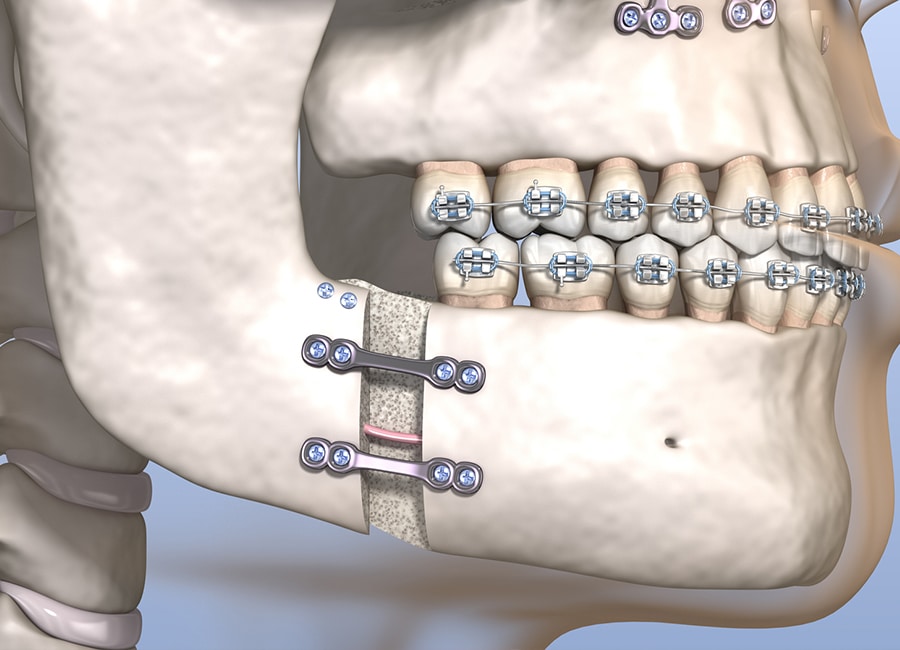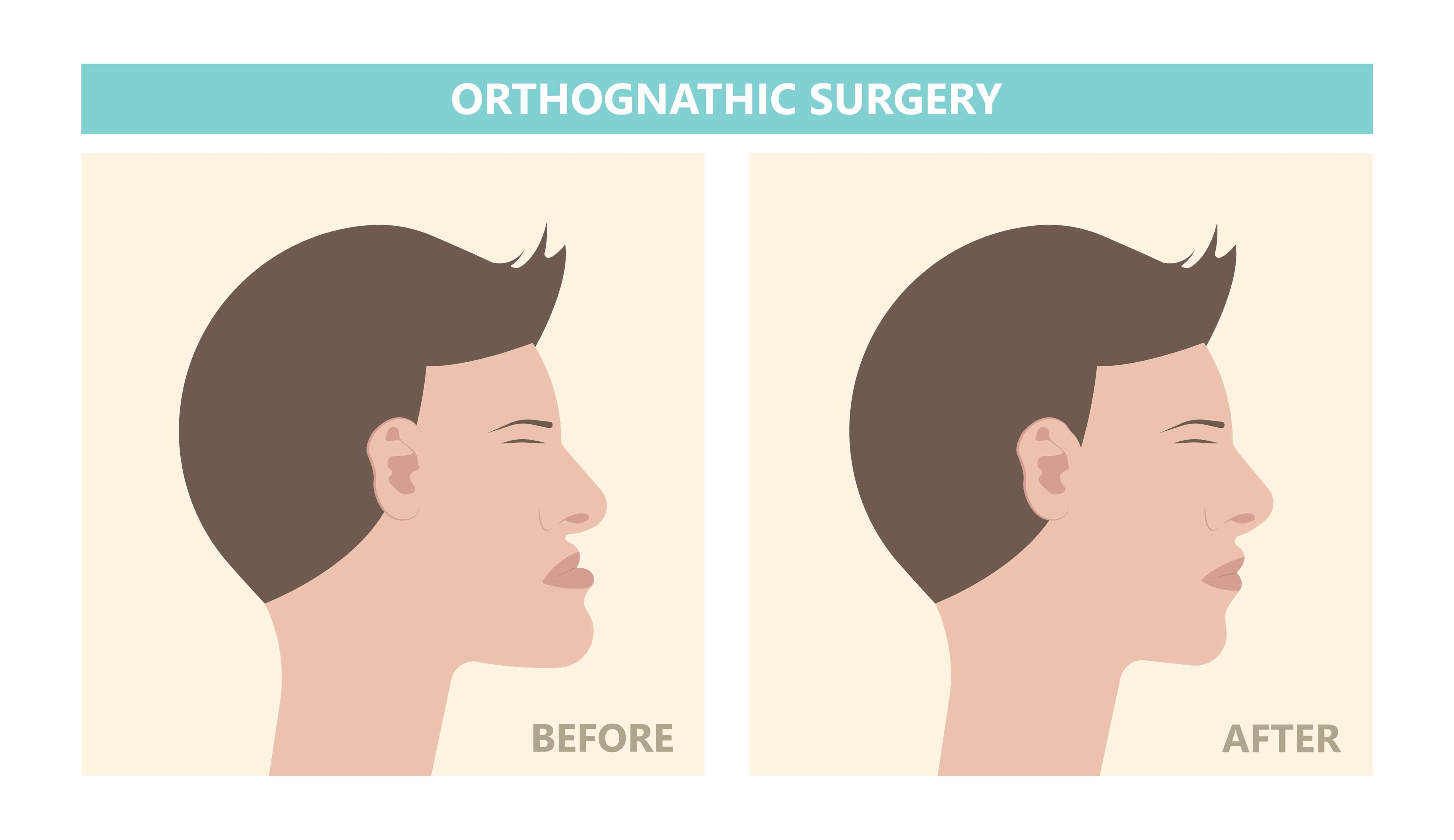Orthognathic Surgery in Milwaukee, WI
Community OMFS provides corrective jaw surgery in Milwaukee, WI. Call 414-810-1707 to learn more and schedule an appointment.
Jaw irregularities not only affect your facial appearance but can also lead to difficulties with chewing, speaking, and proper oral hygiene, which may contribute to conditions such as tooth decay, gum disease, and temporomandibular joint (TMJ) disorders. At Community Oral and Maxillofacial Surgery, we understand the impact of these conditions on our patients' lives. Orthognathic surgery allows us to provide reliable solutions to jaw problems that are affecting your oral health.

What is Orthognathic Surgery?
Orthognathic surgery, also known as corrective jaw surgery, is a specialized surgical procedure aimed at correcting severe jaw irregularities and misalignments. Orthognathic surgery involves precise adjustments to the position of the jaws to achieve optimal alignment and harmony. This not only improves oral function but also enhances facial aesthetics and overall quality of life for patients experiencing significant jaw discrepancies.
What Problems Does Orthognathic Surgery Address?
- Correction of Bite Alignment Issues: Orthognathic surgery is particularly effective in correcting various bite alignment issues such as overbite (where the upper teeth excessively overlap the lower teeth), underbite (where the lower teeth protrude beyond the upper teeth), and crossbite (where the upper and lower teeth do not align properly).
- Improvement of Facial Imbalance and Symmetry: Severe jaw discrepancies can lead to facial asymmetry and imbalance, affecting the overall harmony of the facial features. Orthognathic surgery addresses these concerns by repositioning the jaws to achieve better facial proportion and symmetry.
- Resolution of Breathing Problems: Orthognathic surgery can be instrumental in treating breathing problems associated with obstructive sleep apnea (OSA). OSA is often caused by anatomical abnormalities such as a small or recessed jaw, which can obstruct the airway during sleep. Repositioning the jaws to create a more open airway can help alleviate symptoms of OSA and improve breathing during sleep.
The Orthognathic Surgery Process
Initial Consultation and Evaluation
The journey towards orthognathic surgery begins with an initial consultation at Community Oral and Maxillofacial Surgery. During this comprehensive evaluation, Dr. Khader will conduct a thorough examination of your oral health, facial structure, and jaw alignment. We use diagnostic tools such as X-rays, CT scans, and digital impressions to assess the extent of your jaw irregularities and develop a personalized treatment plan. Of significant importance during this consultation is talking to you and your family/loved ones about your expectations and frustrations with any current jaw alignment issues, as well as a detailed discussion about the course of this journey.

Pre-surgical Orthodontic Preparation
Prior to undergoing orthognathic surgery, patients typically undergo a period of pre-surgical orthodontic treatment. This phase focuses on aligning the teeth and optimizing dental occlusion in preparation for surgical correction of the underlying skeletal discrepancies. Not infrequently, your facial profile or jaw discrepancy will appear more pronounced during this phase of treatment. This is set by design to allow for precise and significant movements during surgery that would yield the most stable and ideal results. Dr. Khader will collaborate closely with your orthodontist to coordinate the orthodontic treatment plan, ensuring that your teeth are properly positioned to facilitate surgical correction.
Surgical Procedure Overview
Once orthodontic preparation is complete, the orthognathic surgery procedure can be scheduled. Dr. Khader will provide a detailed overview of the surgical plan, which may involve repositioning the upper jaw (maxilla), lower jaw (mandible), chin (or a combination of those)to achieve optimal alignment and balance. Orthognathic surgery is performed under general anesthesia in a hospital setting, ensuring patient comfort and safety throughout the procedure.
Post-surgery Recovery and Follow-up Care
Following surgery, patients will require a period of recovery to allow for healing and adjustment. Our team will provide comprehensive post-operative instructions to guide patients through the recovery process, including guidelines for pain management, dietary restrictions, and oral hygiene care. Regular follow-up appointments will be scheduled to monitor healing progress, evaluate jaw function, and make any necessary adjustments to the treatment plan.
Benefits of Jaw Surgery
- Improved Bite Functionality and Oral Health: By achieving proper alignment of the jaws and teeth, you can experience enhanced chewing efficiency, reduced strain on the jaw joints, and a decreased risk of developing dental issues such as tooth decay, cracked teeth, and gum disease.
- Enhanced Facial Harmony and Symmetry: Orthognathic surgery enhances facial aesthetics by repositioning the jaws to align with the rest of the facial features, resulting in a more balanced appearance.
- Improvement in Quality of Life: Addressing facial asymmetry and improving oral function can help you to feel more comfortable and confident.
- Long-term Stability and Results: By addressing the underlying skeletal discrepancies, orthognathic surgery provides a permanent solution to jaw irregularities. With proper post-operative care and maintenance, patients can enjoy the functional and aesthetic benefits of orthognathic surgery for years to come.
Schedule a Jaw Surgery Consultation in Milwaukee, WI
We invite you to take the first step towards achieving optimal oral health and facial harmony by scheduling an orthognathic surgery consultation at Community Oral and Maxillofacial Surgery in Milwuakee, WI. Whether you're seeking solutions for bite alignment issues, facial asymmetry, or obstructive sleep apnea, our experienced team is here to provide compassionate care and personalized treatment options based on your unique needs.
